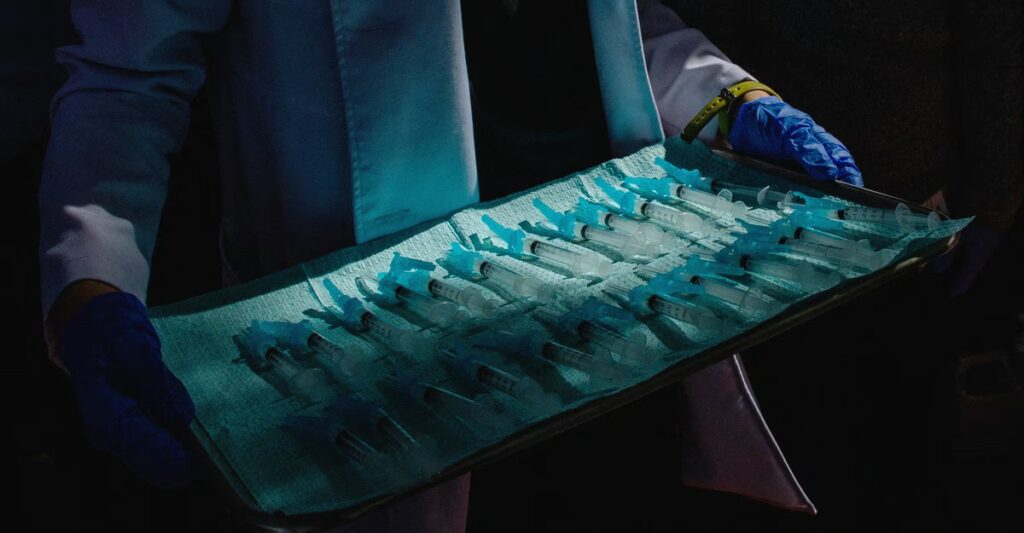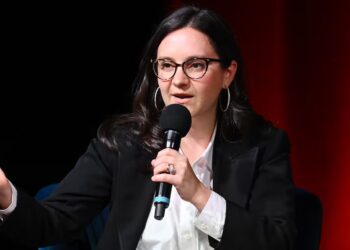If Robert F. Kennedy Jr., the secretary of Health and Human Services, did bother to ask CDC scientists about using their website to turn anti-vaccine talking points into agency guidance, it didn’t matter much. “My understanding is that none of the leadership were asked about it, or if they were asked about changing the website, they did not agree with the change,” Daniel Jernigan, the former director of the National Center for Emerging and Zoonotic Infectious Diseases, told me. But as of last night, there it was: The CDC’s new official stance is that “studies have not ruled out the possibility” that routine childhood immunizations contribute to autism.
A senior CDC scientist told me that many people at the agency heard about the change only yesterday evening, hours before the revamped website launched. The decision appears not to have passed through the normal channels, which would involve staff at the Immunization Safety Office, Jernigan said. When asked via email whether CDC scientists had been bypassed, Andrew Nixon, an HHS spokesperson, didn’t answer. Instead, he reiterated bullet points from the website update, including the claim that studies supporting a link between autism and vaccines “have been ignored by health authorities”—essentially, the CDC accusing itself of having disregarded scientific evidence.
The new language appears in the “Vaccine Safety” section of the agency’s website. Until yesterday, that page laid out autism researchers’ long-standing consensus that vaccines do not cause the disorder. It noted that no link has been found between vaccine ingredients and autism, and that a National Academy of Medicine review of eight routine immunizations found that, “with rare exceptions, these vaccines are very safe.” The website’s affirmation that vaccines do not cause autism was important enough that during Kennedy’s confirmation process earlier this year, Senator Bill Cassidy, a physician, made him promise not to remove it. But instead of keeping his promise, Kennedy—who oversees the CDC as head of HHS—appears to be using the CDC website to advance his own anti-vaccine beliefs.
Technically, the statement “Vaccines do not cause autism” has not been removed from the CDC website. Instead, it has been appended with an asterisk, which is explained at the bottom of the page: “The header ‘Vaccines do not cause autism’ has not been removed due to an agreement with the chair of the U.S. Senate Health, Education, Labor, and Pensions Committee that it would remain on the CDC website.” That asterisk is an obvious farce, because the page is now devoted to undermining the scientific consensus. “‘Vaccines do not cause autism’ is not an evidence-based claim,” the site now states, despite the fact that multiple large studies have found no such association. The site notes that reviews on the measles, mumps, and rubella vaccine concluded that there is no association between the MMR vaccine and autism—but goes on to criticize those reviews as methodologically flawed. It also asserts that the rise in autism rates “correlates with the rise in the number of vaccines given to infants.”
In fact, autism researchers attribute much of that increase to improved screening and broader diagnostic criteria. Studies suggest that about 80 percent of a person’s autism risk comes from inherited mutations in their DNA. (The webpage doesn’t mention genes.) And yet, parents considering whether to vaccinate their child and seeking the CDC’s advice will now get the impression not only that the jury is out on whether vaccines cause autism but also that there is reason to believe they do.
[Read: The U.S. is going backwards on vaccines, very fast]
Kennedy himself has suggested as much for years in books and interviews, and as chair of the anti-vaccine nonprofit Children’s Health Defense. Such statements raised Cassidy’s suspicions during Kennedy’s confirmation process, though Cassidy still voted him into office. Demetre Daskalakis, who was the director of the National Center for Immunization and Respiratory Diseases before resigning alongside Jernigan and former CDC Chief Medical Officer Debra Houry, told me that it seemed to him that Kennedy had tricked Cassidy. “It’s a slap in the face,” he said. (Cassidy’s office did not respond to a request for comment. When reporters for Punchbowl News asked the senator today to comment on Kennedy’s broken promise, he lamented the “double tragedy” of falling vaccine rates and resources being wasted investigating “things we know do not cause autism,” but said nothing about Kennedy.)
Changing the website won’t affect the availability of routine vaccinations for children, at least not in the short term. It could, however, signal an intent by HHS to make it easier for parents of autistic children to pursue claims through the National Vaccine Injury Compensation Program. Houry told me she worries that the cherry-picked evidence on the new site will make parents hesitate over vaccinating their children against dangerous illnesses. In a statement, the Autism Science Foundation condemned the change, saying that the CDC’s vaccine-safety page “is now filled with anti-vaccine rhetoric and outright lies about vaccines and autism.”
Since taking office, Kennedy has been careful to moderate some of his more strident anti-vaccine views, at least in public. During his confirmation hearing, he insisted that he is not anti-vaccine, though he sidestepped questions about whether immunizations cause autism, saying that he would look at the data. In the midst of a measles outbreak in West Texas earlier this year, he paid lip service to the fact that vaccines protect children and the community, but in private, he was more openly conspiratorial. As the father of a girl who died from the measles told me in April, Kennedy said to him that we “don’t know what’s in the vaccine anymore.” Kennedy also fired the CDC’s outside vaccine advisers and replaced them with allies whose views are closer to his own—flouting another promise to Cassidy that he would maintain the advisory board “without changes.”
[Read: Bill Cassidy’s failure on vaccines]
All of those moves broke norms and sowed doubt about vaccines. But if they were a dog whistle, the new CDC website is a siren. Kennedy’s most radical doubts about vaccines have now been enshrined as official government guidance. Children’s Health Defense praised the website change on X, calling it “the biggest public health reversal of our lifetime.” It is indeed.
The post The CDC’s Website Is Anti-Vaccine Now appeared first on The Atlantic.




